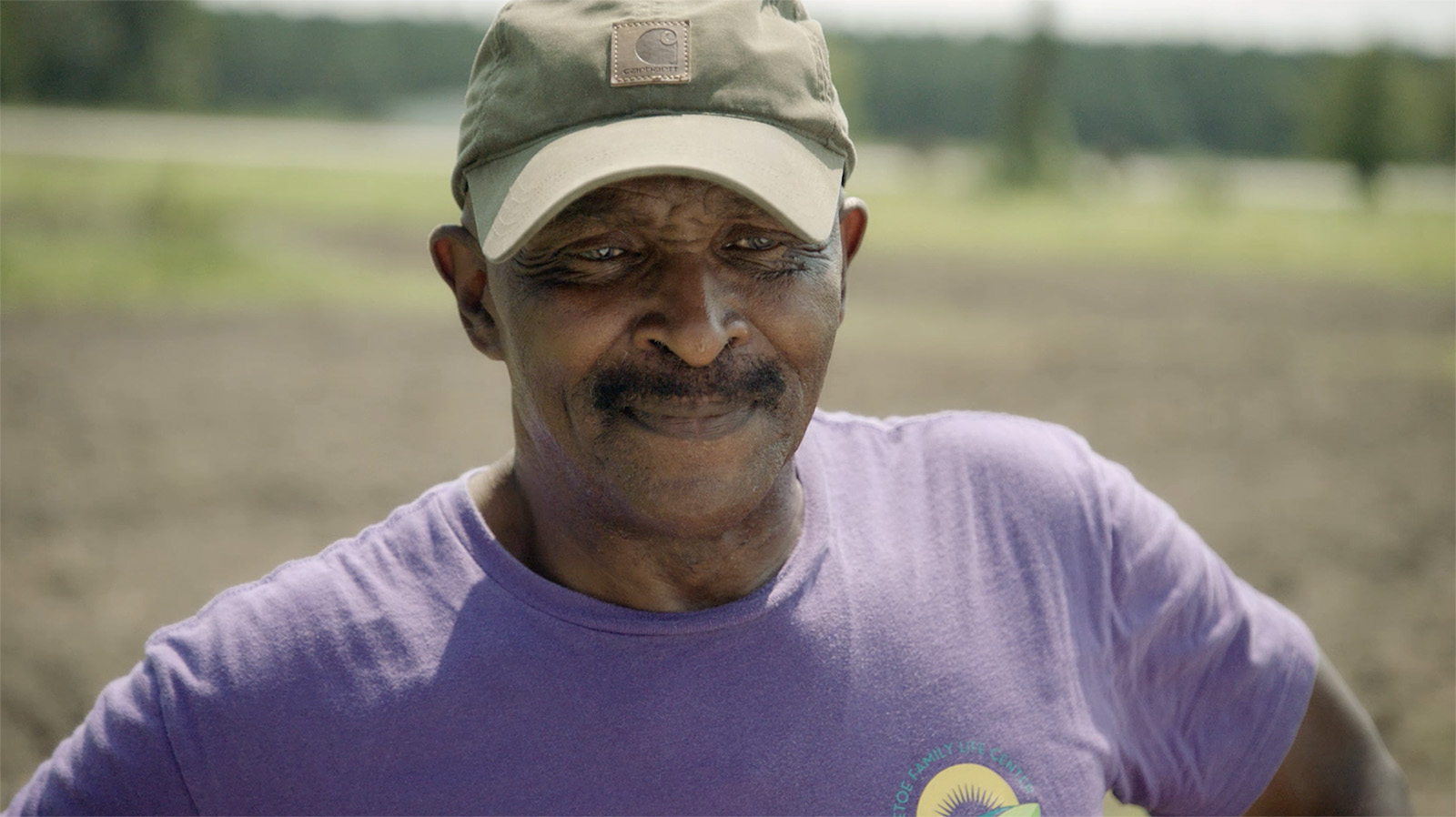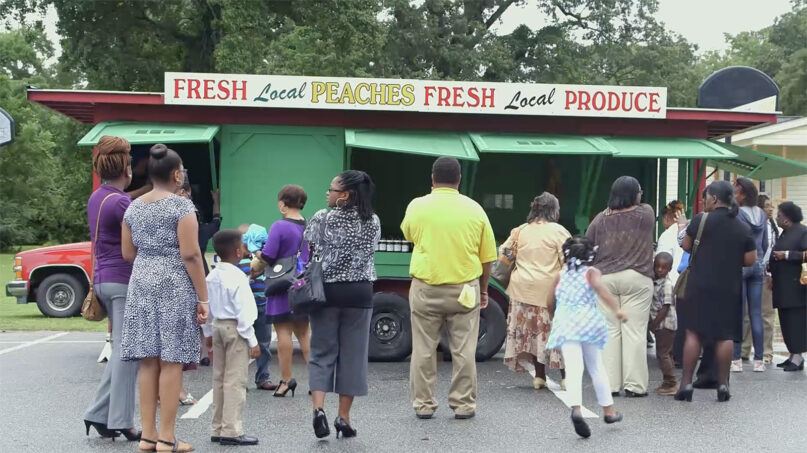
CONETOE, N.C. (RNS) — Congregants at Conetoe Chapel Missionary Baptist Church thought their pastor was crazy when he suggested his rural community take up farming as a way to improve their health and become more self-sufficient.
The small, predominantly Black community, about 80 miles east of Raleigh, is surrounded by vast, fertile farmland but has no grocery store for miles around. According to figures from the Census Bureau, 67% of the residents of Conetoe (pronounced Kuh-NEE-tuh) live below the poverty line.
It turned out, the Rev. Richard Joyner was prophetic. The venture, which in 2007 was spun off into its own nonprofit, the Conetoe Family Life Center, now produces 1,500 boxes of vegetables a week on land it either bought or leases. It partners with multiple outfits including public schools, hospitals, the North Carolina Food Bank and local churches to plant, grow, harvest and package the produce, some of which is sold, but most of which is donated.
Funerals, which Joyner used to conduct too many of, are less common, and the health and wellbeing of his congregants who partake of the vegetables, grown without any synthetic chemicals, has improved, he said.
But now Joyner has another problem. Last month, Hurricane Helene flooded some of his fields, wiping out the late August plantings of salad greens, radishes and beets. The soil was already wet from weeks of rain when the hurricane blew in, dumping 17 inches of rain over a two week period. Back in 2016, Hurricane Matthew also flooded the nonprofit’s fields.

Floodwaters on Conetoe Family Life Center farmland on Sept. 28, 2024, in Conetoe, N.C. (Photo courtesy Later Is Too Late Campaign)
Members of Joyner’s congregation, about 100 people, have suggested maybe God is trying to tell him something.
“We’re in the Bible Belt,” Joyner said. “When my farm floods, people go, ‘Well, God don’t want you to do that. That’s why he keeps flooding it and you need to stop being hard-headed.'”
Joyner’s new rejoinder: “God is not flooding the land. Our behavior is destroying the environment. That’s what flooded the land.”
Over the last few years, the 71-year-old pastor has become not only a farmer but a climate change activist. Last month, he lent his name to a new group, Extreme Weather Survivors, which provides trauma-informed support for people harmed by natural disasters. Some of the group’s members, including Joyner, participated in a Climate Week forum in New York City earlier this month intended to convey the message that extreme weather should not be labeled an “act of God” but an “act of Man.”
Speakers such as Delta Merner, a scientist at the Union of Concerned Scientists, testified that in North Carolina studies have shown that climate change has significantly increased heavy rainfall. In other spots, such as Arizona, she said, science can now show a connection between climate change and record-breaking heat waves, which have become more frequent and intense.
Merner, who studies “attribution science,” a field that aims to determine how much human-caused climate change has directly influenced extreme weather events, said researchers are now able to trace climate change back to major fossil fuel producers and cement manufacturers.

The Rev. Richard Joyner, left, sorts onions with a youth at Conetoe Family Life Center in Conetoe, N.C. (Video screen grab)
Explaining this to church members has not always been easy, but Joyner now sees it as his calling.
Joyner himself was a late convert to both farming and environmentalism. He grew up on the outskirts of Greenville, North Carolina, one of 13 children to parents who worked as sharecroppers. His father, who always kept a garden and some livestock, loved to farm and was especially good at it. But the landowners always cheated him of his earnings, and that soured Joyner on farming.
When he finished high school, Joyner joined the U.S. Army and later the National Guard. He studied chaplaincy at Shaw University and started working as a chaplain at WakeMed in Raleigh and at Nash General Hospital in Rocky Mount. He initially worked with patients who had HIV, the AIDS virus, and later with mothers in labor and delivery. Finally he worked as a hospice chaplain, and that’s where he said his own sense of spirituality was cultivated.
In 2004, he became the pastor of Conetoe Chapel Missionary Baptist Church at the prodding of his mentor, who in his dying days transferred the leadership of the small church to Joyner. Many of the church’s members were suffering from preventable diseases, including diabetes and high blood pressure.
At the time, Joyner was still working in hospice care, and he watched their slow demise and later presided over their funerals.

People line up as a Conetoe Family Life Center produce stand opens in Conetoe, N.C. (Video screen grab)
Convincing members to change their diets and begin exercising was not easy. He said he came to it reluctantly after learning there was no chance a major grocery chain would locate in such a small town, population 671, a classic example of a food desert.
In 2005, Joyner found three property owners willing to let him use their land for a community garden. The first garden was on two acres located a quarter mile from the church.
Church members resisted the idea. Those with painful personal memories of the legacy of Black exploitation working the land were especially suspicious of farming.
But he was able to win over the children and eventually the adults, too. The gardens grew to encompass a wide range of crops, in addition to 30 beehives. (The honey is sold locally.)
Joyner won several awards for his burgeoning community farm, including a 2014 Purpose Prize, which recognizes social innovators older than 60. The farm partnered with several universities to study whether food-as-medicine interventions work on people with chronic diseases. It also started a health kiosk on the farm where people can contact health providers online. CNN did a feature story about the enterprising pastor and his community farm. More recently, the Conetoe Family Life Center built a kitchen on the farm where people can learn to prepare plant-based nutritious meals.
Church members caught on.
“I was very heavy into the meat in the vegetables that you cook and I have almost completely gotten away from that,” said Betty Jones, a retired high school cafeteria manager who is a church member and takes advantage of the fresh vegetables from the farm.
She acknowledged, “There’s one last food that I have not gotten away from the meat yet — and those are my collard greens — but everything else, I’m doing it without the meat in there, and they taste good.”
Now, Joyner is studying how to change farm practices in a time of climate change.
Walking across his ruined fields — a vast gray zone of brittle soil and dead weeds that crackle underfoot, he points to the road built several decades ago that divided the field in two.
“You could tell the elevation of that road is higher than this land,” he said. “This field has become a catch basin. It took me a while to see it until one of the guys came up and said, ‘your farm is sitting in a mud hole.’”

The Rev. Richard Joyner walks on a field that was recently flooded by Hurricane Helene in Conetoe, N.C., Oct. 14, 2024. (RNS photo/Yonat Shimron)
He’s now considering different ways of farming. He recently learned that tractors can compact soil and increase the risk of flooding by making the soil less porous. He also knows that high tunnels — unheated, plastic-covered hoop-house structures — can provide some protection from rain and include some anti-flooding drainage systems. One such high tunnel on the farm saved rows of peppers — banana peppers and habaneros — from being ruined. He now wants to build more.
But finally, there’s the job of advocacy — getting people to understand that they live in a relationship with creation and that if they abuse and manipulate that relationship there will be consequences.
Living in relationship to the earth and to other human beings and sharing that bounty is now the core of his spiritual journey.
“I’ve been in Christianity all my life,” Joyner said. “But, these fields have become the most powerful place of worship I’ve ever been on.”
It’s a lesson his parents and grandparents knew and one he hopes more people can recover.
“My grandma would always say, this is God’s beautiful earth and you have one responsibility, to leave it better than when you got here,” Joyner said. “I take that seriously.”

Floodwaters cover Conetoe Family Life Center farmland on Sept. 28, 2024, in Conetoe, N.C. (Photo courtesy Later Is Too Late Campaign)
